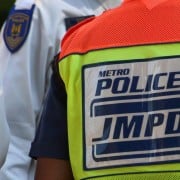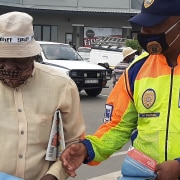|
Getting your Trinity Audio player ready...
|
On top of looming e-tolls and rapidly increasing petrol prices, South Africans are deeply affected by the “unofficial road tax” that is tjo-tjo.
This is the now commonly used word, in township slang, describing bribes. The bribe is either demanded by a metro police officer to an errant motorist, or offered by said errant motorist in an effort to avoid paying the full penalty as required by law.
A lot of motorists have been on the receiving end of the “I’m hungry” or “I need a Coke” line from officers asking for “tjo-tjo”.
All you need to do is slip a R50 or R100 note in between the pages of your identity book, hand it to the officer so as not to arouse the suspicions of his or her colleagues, or passers-by, and the traffic ticket is gone.
It may seem like an efficient way to speed up the process that would otherwise require you to wait while a ticket form is being filled in – and avoid the requirement by law for you to pay the fine at designated official establishments.
Motorists, including taxi drivers, are however beginning to feel the wrath of officers who are fond of the practice when they choose not to give a bribe.
Brian Sithole has been driving a taxi for four years now and says that he is used to paying, on average, one bribe a day. This was until sometime recently when Sithole didn’t have the R50 he was asked for by an officer.
“The policeman said ‘my man, you think I’m joking?’ and I didn’t know what to do,” Sithole said.
“I was given a R1 250 fine for not having R50 to pay a bribe!”
Sithole’s offence? Not having a proper public service licence that is issued for public transport operators. He claimed that he had applied for the new one, but had not received it yet.
It’s a strange relationship, explained another taxi driver who wished to remain anonymous – referring to the daily encounters his colleagues have with metro police officers.
“I’m not saying you must give tjo-tjo, but what do you want us to do? Go to jail?” he asked.
He said he was convicted for assault in 1998 and spent four years at Pretoria Central Prison. While incarcerated he furthered his studies by taking classes in business management.
However, he has not been able to find a job in this field since his release. He is now employed on a full-time basis as a taxi driver and with the money he earns is able to support a nephew who goes to school.
“If you drive slowly, the old ladies at the back [of the taxi] start complaining, saying you’re making them late for work,” he said. “But if you drive on the yellow line, you’re likely to get a ticket.”
Users of the public transport system may think that because they are not driving the vehicle, they are not liable for the bribe.
However, CEO of the South African Chamber of Commerce and Industry Neren Rau explains that the cost of corruption eats into the pocket of both the driver and the passenger.
“In a normal situation, businesses would pass these costs on to consumers. Additional pressure brought on by corrupt activities will be ‘paid for’ by the consumer,” he said.
Rau went on to explain that it’s difficult for taxi drivers, in this case small business owners, to grow their income because of higher expenses and constant spot fines that are not budgeted for.
“If a business is to grow, sales must increase and input costs must remain the same,” he said.
With constant increases in fuel and energy costs, Rau is not sure how taxi operators will manage to make more money without their passengers also feeling the pinch.







